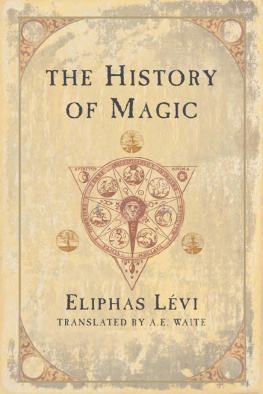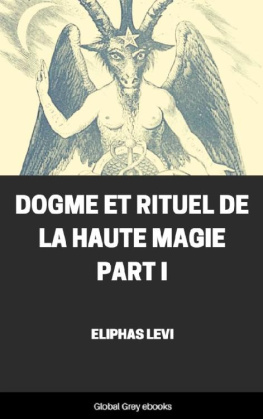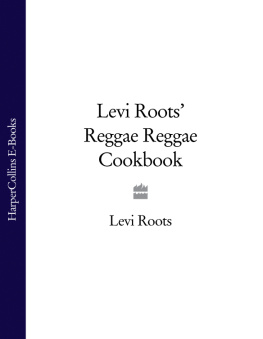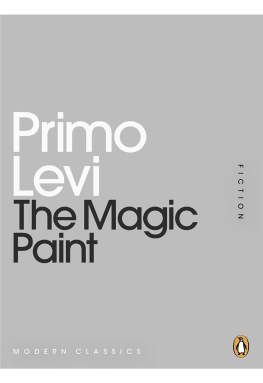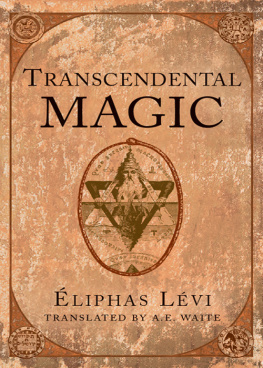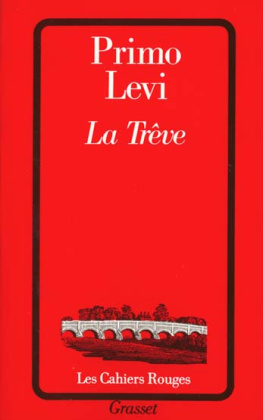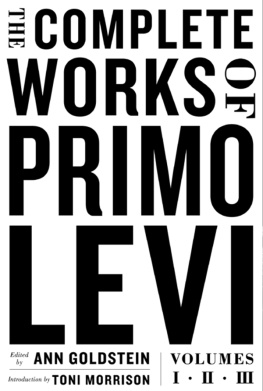Éliphas Lévi - Magic
Here you can read online Éliphas Lévi - Magic full text of the book (entire story) in english for free. Download pdf and epub, get meaning, cover and reviews about this ebook. year: 2012, publisher: Dover Publications, genre: Religion. Description of the work, (preface) as well as reviews are available. Best literature library LitArk.com created for fans of good reading and offers a wide selection of genres:
Romance novel
Science fiction
Adventure
Detective
Science
History
Home and family
Prose
Art
Politics
Computer
Non-fiction
Religion
Business
Children
Humor
Choose a favorite category and find really read worthwhile books. Enjoy immersion in the world of imagination, feel the emotions of the characters or learn something new for yourself, make an fascinating discovery.
- Book:Magic
- Author:
- Publisher:Dover Publications
- Genre:
- Year:2012
- Rating:3 / 5
- Favourites:Add to favourites
- Your mark:
- 60
- 1
- 2
- 3
- 4
- 5
Magic: summary, description and annotation
We offer to read an annotation, description, summary or preface (depends on what the author of the book "Magic" wrote himself). If you haven't found the necessary information about the book — write in the comments, we will try to find it.
Magic — read online for free the complete book (whole text) full work
Below is the text of the book, divided by pages. System saving the place of the last page read, allows you to conveniently read the book "Magic" online for free, without having to search again every time where you left off. Put a bookmark, and you can go to the page where you finished reading at any time.
Font size:
Interval:
Bookmark:
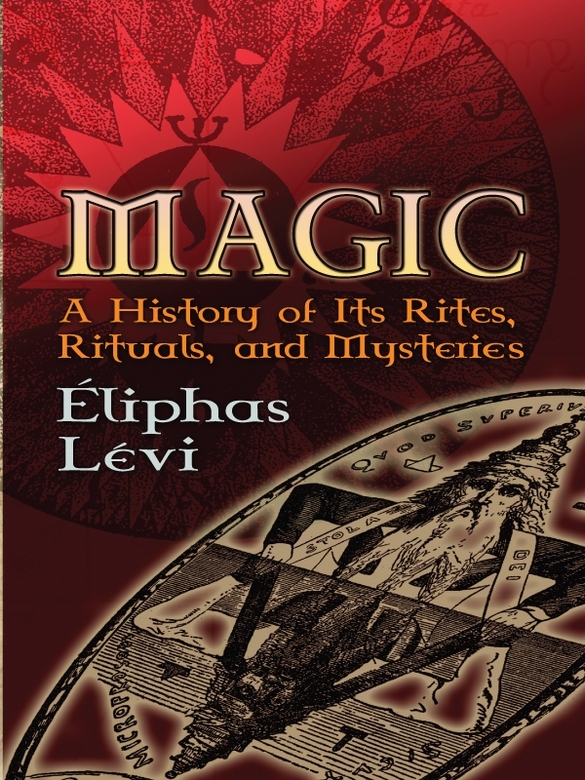
THE works of Eliphas Lvi on the science of the ancient Magi are intended to form a complete course, divided into three parts. The first part contains the Doctrine and Ritual of Transcendental Magic; the second is The History of Magic; and the third will be published later under the title of The Key to the Great Mysteries. Taken separately, each of these parts gives a complete instruction and seems to contain the whole science; but in order to a full understanding of one it is indispensable to study the two others carefully.
The triadic division of our undertaking has been imposed by the science itself, because our discovery of its great mysteries rests entirely upon the significance which the old hierophants attached to numbers. THREE was for them the generating number, and in the exposition of every doctrine they had regard to (a) the theory on which it was based, (b) its realisation and (c) its application to all possible uses. Whether philosophical or religious, thus were dogmas formed; and thus the dogmatic synthesis of that Christianity which was heir of the magi imposes on our faith the recognition of Three Persons in one God and three mysteries in universal religion.
We have followed in the arrangement of the two works already published, and shall follow in the third work, the plan indicated by the Kabalahthat is to say, by the purest tradition of occultism. Our Doctrine and Ritual are each divided into twenty-two chapters distinguished by the twenty-two letters of the Hebrew alphabet. We have set at the head of each chapter the letter thereto belonging and the Latin words which, according to the best writers, represent its hieroglyphical meaning. For example, at the head of the first chapter will be found:
I  A
A
THE RECIPIENT
Disciplina
Ensoph
Kether
The explanation is that the letter Aleph equivalent to A in Latin, and having the number 1 as its numerical valuesignifies the Recipient, the man who is called to initiation, the qualified personality, corresponding to the Bachelor of the Tarot. It signifies also disciplina, or dogmatic syllepsis; Ensoph, or being in its general and primary conception; and finally, Kether, or the Crown, which, in Kabalistic theology, is the first and obscure idea of Divinity. The chapter in question is the development of the title and the title contains hieroglyphically the whole chapter.
The History of Magic, which follows, narrates and explains, according to the general theory of the science furnished in the Doctrine and Ritual, the realisation of that science through the ages. As the Introduction explains, it is constituted in harmony with the number seventhe septenary being the number of the creative week and of Divine Realisation.
The Key to the Great Mysteries will be established on the number four which is that of the enigmatic forms of the sphinx and of elementary manifestations. It is also the number of the square and of force. In the book referred to, certitude will be established on irremovable bases. The enigma of the sphinx will have its complete solution and our readers will be provided with that Key of things kept secret from the foundation of the world which the learned Postel only dared to depict enigmatically in one of his most obscure books, giving no satisfactory explanation.
The History of Magic explains the affirmations found in the Doctrine and Ritual; the Key of the Great Mysteries will complete and explain the History of Magic. In this manner, for the attentive reader at least, we trust that nothing will be found wanting in our revelation of the secrets of Jewish Kabalism and of Supreme Magicwhether that of Zoroaster or of Hermes.
The writer of these books gives lessons willingly to serious and interested persons in search of these; but once and for all he desires to forewarn his readers that he tells no fortunes, does not teach divination, makes no predictions, composes no philtres and lends himself to no sorcery and no evocation. He is a man of science, not a man of deception. He condemns energetically whatsoever is condemned by religion, and hence he must not be confounded with persons who can be approached without hesitation on a question of applying their knowledge to a dangerous or illicit use. For the rest, he welcomes honest criticism, but he fails to understand certain hostilities. Serious study and conscientious labour are superior to all attacks; and the first blessings which they procure, for those who can appreciate them, are profound peace and universal benevolence.
LIPHAS LVI.
THE apocryphal Book of Enoch says that there were angels who consented to fall from heaven that they might have intercourse with the daughters of earth. For in those days the sons of men having multiplied, there were born to them daughters of great beauty. And when the angels, or sons of heaven, beheld them, they were filled with desire; wherefore they said to one another: Come, let us choose wives from among the race of man, and let us beget children. Their leader, Samyasa, answered thereupon and said: Perchance you will be wanting in the courage needed to fulfil this resolution, and then I alone shall be answerable for your fall. But they swore that they would in no wise repent and that they would achieve their whole design. Now there were 200 who descended on Mount Armon, and it was from this time that the mountain received its designation, which signifies Mount of the Oath. Hereinafter follow the names of those angelic leaders who descended with this object: Samyasa, chief among all, Urakabarameel, Azibeel, Tamiel, Ramuel, Danel, Azkeel, Sarakuyal, Asael, Armers, Batraal, Anane, Zavebe, Samsaveel, Ertrael, Turel, Jomiael, Arazial. They took wives, with whom they had intercourse, to whom also they taught Magic, the art of enchantment and the diverse properties of roots and trees. Amazarac gave instruction in all secrets of sorcerers; Barkaial was the master of those who study the stars; Akibeel manifested signs; and Azaradel taught the motions of the moon.
This legend of the Kabalistic Book of Enoch is a variant account of the same profanation of Mysteries which we meet with under another form of symbolism in the history of the sin of Adam. Those angels, the sons of God, of whom Enoch speaks, were initiates of Magic, and it was this that they communicated to profane men, using incautious women as their instruments. They split upon the rock of sense-attraction, becoming enamoured of the female sex, and the secrets of royalty and priesthood were extracted from them unawares. Primitive civilisation collapsed as a consequence, and the giants, who typified brute force and unbridled appetite, fought together for the world, which escaped only by immersion in the waters of the deluge, wherein all traces of the past were effaced. This deluge symbolised that universal confusion into which humanity is brought of necessity when it ignores and does outrage to the harmonies of Nature. There is kinship between the fall of Samyasa and that of Adam; the lure of sense seduced both; both profaned the Tree of Knowledge; and both were driven far away from the Tree of Life. It is needless here to discuss the views, or rather the simplicity, of those who take everything literally and believe that knowledge and life were once manifested under the form of trees; let us confess rather and only to the deep meaning of sacred symbols. The Tree of Knowledge does actually inflict death when its fruit is eaten; that fruit is the adornment of this world; those golden apples are the glitter of earth.
Font size:
Interval:
Bookmark:
Similar books «Magic»
Look at similar books to Magic. We have selected literature similar in name and meaning in the hope of providing readers with more options to find new, interesting, not yet read works.
Discussion, reviews of the book Magic and just readers' own opinions. Leave your comments, write what you think about the work, its meaning or the main characters. Specify what exactly you liked and what you didn't like, and why you think so.


